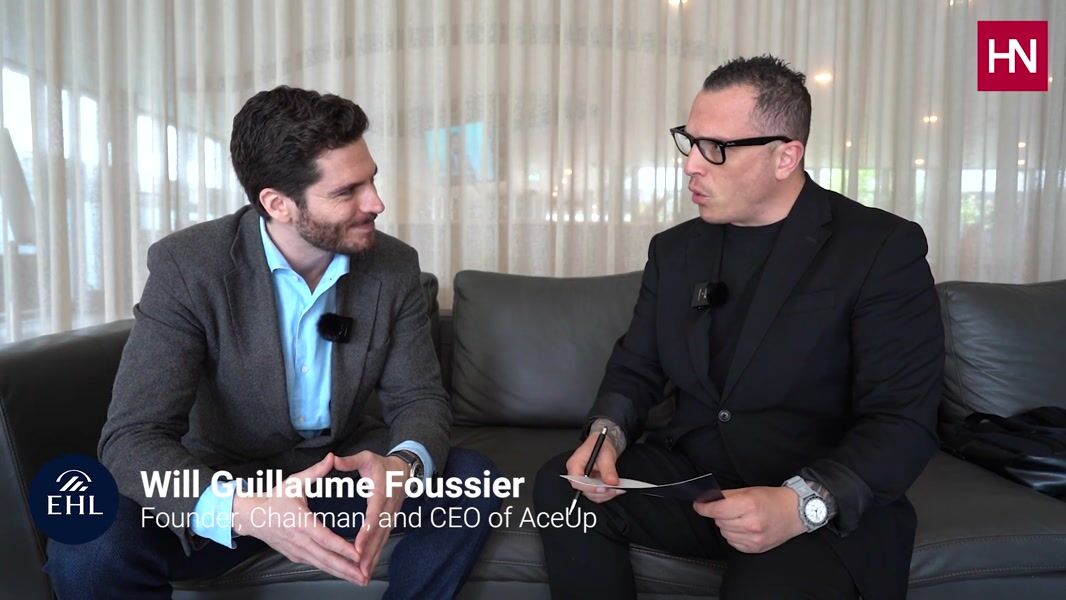
At the EHL Open Innovation Summit, we spoke with Will Guillaume Foussier, CEO of AceUp, to explore how artificial intelligence is reshaping revenue strategies in hospitality and why coaching remains one of the most powerful drivers of lasting change. Will introduced his IDEAL framework, a structured model that connects individual growth with team alignment and organizational transformation.
Which technology or innovation do you think will reshape our industry the most over the next 5 to 10 years?
Probably not going to surprise anyone, but the answer is artificial intelligence. I have seen firsthand how AI is reinventing revenue management across hospitality chains. We are going to see more and more client experiences that are digital and data-driven. This has already been happening for years, and it is evolving to a point where we are not just talking about revenue managers anymore, but about a broader yield management role entirely redefined by technology.
One misconception people have about coaching is that it is supposed to make you feel good. Is that really what coaching is about?
It can be, if that is the method needed to reach the right outcome. But by default, coaching is not about feeling good. Coaching is about triggering critical and creative thinking that leads to new approaches, new behaviors, and ultimately different outcomes. A good coaching methodology is one that challenges you. I remember during COVID, I was preparing for a difficult board meeting. I was sugarcoating the narrative, and my coach stopped me and asked, “Are you afraid? Are you a coward?” That was what I needed to hear to face the truth and communicate with clarity. A good coach challenges the way you think and operate. That is where transformation happens.
Coaching is often thought of as a one-to-one practice. But you mentioned a framework called IDEAL. Can you explain that?
Absolutely. IDEAL stands for Individual, Team, and Organization. Sometimes we describe the organization as a “team of teams.” If you want to drive change across an organization, you start with the individual, move through the team level, and then align across the broader structure, especially the executive leadership team. One of the biggest frustrations companies have is when coaching happens in silos. It starts and stops at the individual level without being tied to common goals, outcomes, or systems. That is not sustainable change. At AceUp, we use AI and data to assess skill gaps and identify what is needed to support strategic initiatives. Then we facilitate a process called “recontracting” between team leaders and members. It is about reshaping the social contract in the workplace. Coaching becomes a tool to realign people on what we are trying to do and how we want to do it.
Is this kind of structured coaching the only way to truly shift mindsets and behaviors?
Yes. Coaching is ultimately here to upskill people and change mindsets. But to scale transformation, you need a framework that moves from individual change to collective change. That is why the social contract is so important. It is the lens through which people and organizations can drive lasting transformation. Coaching works best when it supports a shared vision and shared accountability.
About the EHL Open Innovation Summit 2025
This interview was recorded during the EHL Open Innovation Summit in Lausanne, where Hospitality Net joined as official media partner.
The event brought together a global mix of thinkers and doers to explore the future of hospitality, food, and travel through open innovation. What made it special was the mix of ideas, formats, and people. It was not only about tech or talks. It was also about people showing up, working together, and sharing energy in real time.
Key Figures
- 385 participants
- 48 speakers and contributors from more than 20 countries
- 7 innovation challenges collectively addressed
- 45 sessions
- 25 student volunteers
- 15 F&B startups letting us taste the future
- 1.5 days of connection, learning, and co-creation
Key Insights from the Summit
- A new benchmark for hospitality innovation
The summit set a new standard by weaving together AI, sustainability, regeneration, and human connection – showing that innovation in hospitality, luxury and food must be holistic, human-centric, and purpose-driven. Participants repeatedly highlighted the need to go beyond efficiency and into meaningful transformation. - From knowledge exchange to real-time co-creation
More than just a series of talks, the summit was an activation space – a living lab where diverse minds worked together on pressing challenges, from regenerative tourism to circular luxury to AI in guest experience. It was a showcase of collective intelligence in motion. - Collaboration as the engine of systems change
Open Innovation came alive not as a buzzword, but as a relational practice. From panelists to students, from global explorers to startup founders, everyone was invited to co-create, connect dots, and contribute. Participants repeatedly said they experienced true collaboration across boundaries, industry, sector, age, and background. - The power of presence: hearts, minds, and hands
Whether walking in the forest, painting together, or debating future systems, attendees embraced the idea that innovation isn’t only about tech and metrics – it’s also about embodied experience, slowing down to speed up, and nurturing a regenerative mindset. - The future is “AND” – not “either/or”
A recurring takeaway: we must stop choosing between extremes. The future is tech AND human, healthy AND delicious, profitable AND impactful. This “integration mindset” is already informing how leaders, startups, and educators present are reshaping their strategies. - The beginning of a long-term movement
Attendees described the summit as the start of something much bigger – a platform for experimentation, learning, and alliance-building. The EHL Innovation Hub was recognized not only as an academic powerhouse, but as a true catalyst for regenerative innovation across hospitality, service, food, and travel.
Please visit:
Our Sponsor
